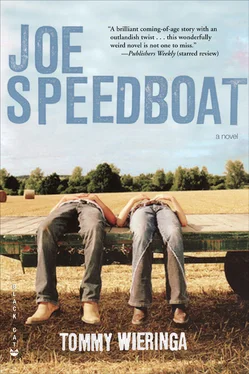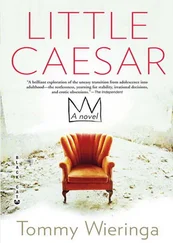I saw Koeksnijder at the street market one afternoon and suddenly understood what I’d seen before, the time he and P.J. had crossed the river and stopped to talk to us: a man about to lose his most valued possession. In essence he was already braced against the pain back then, it was already in his movements, but his awareness had continued to put up a fight. Now that she was gone, what we saw was a pauper who’d once been made king for a day.
I felt sorry for him — he had grown smaller, a figure from the past, not half the self-assured titan he had once been, but I’d be lying if I said that my relief wasn’t greater than my pity. I didn’t want to see anyone with P.J., and particularly not him.
She was my most valued illusion.
The situation was less than ideal: in the realm of fantasy I had to share her with Christof, who was subject to the same visions. I eliminated him from my daydreams with axes, trucks and heavy objects that fell on him at my behest.
*
Each Saturday I went door to door collecting scrap paper. After a while everyone knew what I was coming for, sometimes they had the bundles of brochures and newspapers waiting for me. The brochures were no use to me, but I let it go, it was touching to see the care with which some people tied up handy packages for me, bound with lengths of twine and knotted at the top. They seemed pleased to be able to do something like that. I wasn’t quite sure how to deal with it.
Some of them made me wait outside, others said, ‘Come in, Frankie, do come in!’ and gave me a cup of coffee or a cigarette. Until then I had seen those houses only from the outside. This gave me lots of new insights. Now I could write my History from the inside as well. How do we live? What happens behind closed doors? What does it smell like? (Shoe polish. Furniture wax. Buttered frying pans. Old carpet.) Here in Lomark we listen to a transistor radio on the kitchen table, beside it a copy of the radio guide and lying on top of that a set of keys and a giro slip from a Catholic charity. In the living room, family photographs on the mantelpiece (Catholic families always taken from far away because otherwise they don’t all fit in the viewfinder) and the eternal houseplants on the windowsill.
But what does that tell you? That things have gone well for us, during the second half of the twentieth century? We drive comfortable cars and heat our middle-class homes with natural gas. The Germans are long gone, after that we were afraid of Communists, nuclear weapons and recession, but death is worse. No one tells us what to do, but we know what’s expected of us. Don’t talk about a thing, but never forget anything either. We remember everything, and in silence we hoard information about those who surround us. Between our lives run invisible lines that separate or connect us, lines an outsider knows nothing of, no matter how long he lives here.
I’ve heard and seen a lot in those houses. I’ve heard the voice with which we speak around here of present and past, I’ll do my best to let that be heard as well. About the National Socialist Movement, for example. When the Dutch National Socialist Movement received 8 percent of the popular vote during the parliamentary elections in 1935, we here in Lomark shouldered our share of the load. Some of the things-aren’t-what-they-used-to-be men remember real well. If they would talk about it, it would sound like this:
He came here to give a speech, Anton Mussert, born beside the big river just like us. He was there for us, for the shopkeeper and the market gardener still reeling from the Crisis, who never got a penny of government support. He was a former head engineer with the Utrecht Province Department of Roads and Waterways, a man of the delta. We, who wanted nothing but a return to the old certainties, applauded loudest for the man who promised to restore Faith in God, Allegiance to People and Fatherland and the Love of Work. The meeting was held in the Ferry House down by the river. It was a winter evening, and they arrived from Utrecht in a couple of cars, they drove there along the Lange Nek. It was a small army of men in hats and long overcoats who climbed out and lined up beside the entrance, in the weak light shed by the lamp above the door. As though on cue they raised their right arms in the fascist salute and shouted a powerful ‘ Hou Zee! ’ You could see their breath steaming, when they went into the Ferry House they were silent and disciplined.
The party was doing us a great honour with the Leader’s visit. More than two hundred people had gathered in the pine-panelled Peace Hall, they came from far and wide to hear him speak. Mussert was a round man, actually kind of short. I guess maybe we felt a little disappointed at first when we saw this man whose dark hair had receded to the back of his head, leaving only a tuft at the forehead that he combed to a jaunty quiff. But we were so mistaken! A voice shouted, ‘The Leader!’ Then Mussert marched to the front out of a dark cloud of storm troopers and looked us over with his strikingly pale eyes. His body had moulded itself to the task history had laid on him: his chin jutting, his shoulders thrown back, like the first runner to cross the finish. When he raised his right arm, as though driven by a powerful spring, he kindled awe and pride in us, and we rose as one to return his salute. That is how we stood, facing each other. Then his arm dropped, pushing us as it were back into our seats, and he administered the following jolt of electricity.
‘Brothers of our nation!’
We shivered with an obedient kind of pleasure, with warmth and reverence. His right eye spit fire, but the rational left eye weighed each word that crossed his thin lips. In unbending earnest he spoke to us about the degeneration of the modern age. About the Red Menace. About the farcical regime of the anti-revolutionary Colijn.
‘We see the continuing decline of trade and industry, terrorization by an army of presumptuous civil servants, and impoverishment. We shall free the people from the yoke of the political parties! The farmers will pursue their calling again as of old; workers from high to low, from director to errand boy, will once again come to realize that they have a task to fulfil in harmony on behalf of their people! A new prosperity shall be established; strict, powerful, but loving. . Our able-bodied folk will defend our soil, our fatherland, our empire with all of the strength at our command, against all those who would mar the lustre of our independence or our territory!’
This was no political will-o’-the-wisp, not the way his opponents said, here stood a statesman. He was the one we would follow, he was the right man to lead us out of the Crisis to better days. Even the hearts of the doubters went out to him. His voice soared, the volume was raised.
‘The Netherlands shall be independent of all foreign powers, a bulwark of peace, prepared to defend itself against all attackers, prepared to help build a federation of European states between whom confidence has been restored, who will prove a worthy instrument for the preservation of European peace and European culture!’
Our applause rained down on him. He was visibly pleased to be the object of our cheers. He spoke for an hour, then someone else came up to instruct us in how we ourselves could contribute to the restoration of our nation. After that we sang ‘A Mighty Fortress Is Our God’ and the national anthem, and then it was over. Buzzing with new hope we left the Peace Hall. Many of us bought copies of Volk en Vaderland . Far away, on the dyke, the red tail lights of Mussert’s convoy disappeared into the night.
For Papa Africa, all the world’s rivers were the same. They may have had different names, but all fed one and the same current. The Nile was the only river on earth, and at some point all the earth’s waters flowed past his father’s shipyard in Kom Ombo.
Читать дальше












